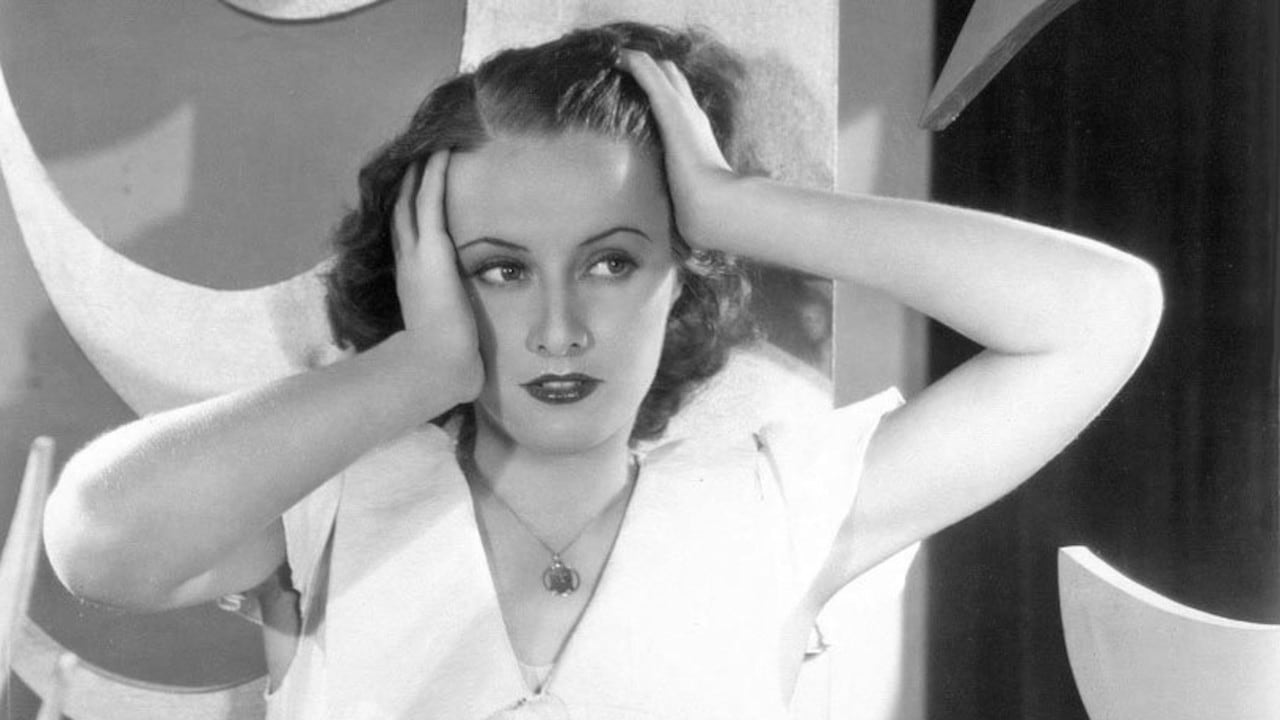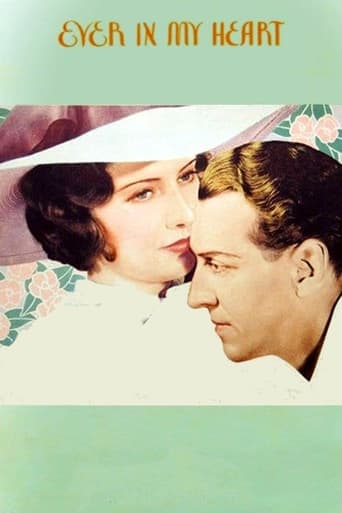

The same year that Adolph Hitler became chancellor of Germany, Warner Brothers released this movie set during the days just before World War I where young Barbara Stanwyck, preparing to marry the handsome Ralph Bellamy, falls in love at first sight with his German born pal Otto Kruger. Bellamy is out and Kruger is the one who waits for her to walk down the aisle, much to the disgust of her prejudiced family. Perhaps there's good reason, as the marriage seems to fail, and Kruger suddenly disappears, just as the Lusitania is sunk and war is declared. Stanwyck ends up working in France along side Bellamy and suddenly recognizes a rather sullen soldier to be her estranged husband, with the revelation of where his loyalties lie and the decision she makes to change the destinies of both of them, as well as the war itself.This is perhaps the only film where Otto Kruger played the leading male part, and while he is a fine character actor, a romantic idol he is not. He played ruthless businessmen, generous doctors and best friends very well, but I didn't for one minute believe that there would be a spark between him and Stanwyck. Unlike other older actors she's been paired with in other films, there's supposed to be a heat between them to generate some sort of passion, but even the staid Bellamy has more passion than Kruger can generate. Even stranger, there's an almost incestuous like relationship between Stanwyck and her brother (Frank Albertson) who seems to become insanely jealous of the "passion" between Stanwyck and Kruger.Looking nothing like her Aunt Pitty Pat, Laura Hope Crews wears much aged make-up to play Stanwyck's imperious grandmother. Ruth Donnelly, Clara Blandick, Nella Walker and Virginia Howell play domestics or other relatives. Ironically, Blandick (like Bellamy in the Frank Capra film "Forbidden") had played a villainous role opposite Stanwyck the year before in "Shopworn", but here, she is much kinder and supportive. This is unfortunately a weird film that doesn't quite express an anti-war sentiment but gives a paranoia about German immigrants that would grow increasingly stronger over the next few years as Hitler's agenda became obvious and the world headed into another war. Stanwyck gives her typically sincere performance, but the stunning ending sort of came out of nowhere, leaving me completely disappointed over the rest of the film that didn't generate the needed heat to deserve such a surprising twist.
... View MoreYes, this is one of the most tragic stories I have ever seen put to film. A young woman (Barbara Stanwyck) is in love with Ralph Bellamy, but then falls in love with Otto Kruger, a German national who is visiting Bellamy. Stanwyck and Kruger get married, have a child...and a dog...and are living a happy life until World War I breaks out. The community turns against them because of Kruger's former German citizenship, even though before the war he became an American citizen. Their child dies (somewhat unexplained), the dog is tortured to death (also ignore Sara Marie's review on this topic since it is not portrayed, only referred to), and Kruger is fired from his job as a professor. Barely subsisting, Stanwyck goes to live with family, and instead of following her "before Christmas", Kruger returns to Germany a bitter repatriate. There he becomes a spy for the Germans, and by great coincidence Stanwyck (as a worker at a canteen), Kruger, and Bellamy (in the army) all end up at the same place near the front. Kruger is there to spy on troop movements, which will endanger the lives of thousands of Americans including Bellamy and Stanwyck's brother. One last night together, then Stanwyck poisons a last toast of wine between her and Kruger, and they both die before he can pass on his information to the Germans.The problem here is not the story. Yes, you have to suspend belief a bit to imagine the 3 principals would all end up near the front at the same time, but then again, most films require us to suspend belief. The problem is twofold -- the overall pace of the film, and the gaps in the story. Both of these issues are somewhat common in films before what I think of as Hollywood's maturity -- and that maturity took place right around 1932-1933 when this film was made. A couple of years later, I suspect a slightly longer film (this is only 68 minutes long) would have eliminated gaps and filled in the story nicely.Stanwyck is excellent here. Bellamy and Kruger good to very good. Frank Albertson shallow. And, Laura Hope Crews is here as the grandmother (Crews was later Aunt Pittypat in "Gone With The Wind").As indicated, the film has its flaws, but is well worth watching as a reminder that Americans are not always uplifting, kind, and generous people. This is a tragic war story, a paints a sad picture of how our society can behave at times.
... View MoreGood little Warners soap, up to a point--and at that point it veers off into ridiculous plot coincidence and a rushed, depressing ending. Stanwyck contributes even more expressiveness than her considerable usual, and Kruger is an appealing leading man, until the wild contortions of the plot lead us to hate him, after the movie's spent three-quarters of its time cementing our allegiance to him. Warners, always wanting to be The Socially Conscious Studio, registers some truths about American prejudice that must have rung true and discomfiting a decade after the war. But then it hedges its bets by telling us, see, you never should have trusted this guy in the first place. Bellamy's stuck on the sidelines playing his usual Guy Who Doesn't Get the Girl, and there are tasty contributions from Elizabeth Patterson and the ever-indispensable Ruth Donnelley.
... View MoreFor a retired history teacher, there sure is a lot to love about this film. "Ever in My Heart" discusses one of the big secrets of twentieth century American history. Few today realize that during WWI, there was a serious backlash against Germans living in the United States. This is odd, as through most of the war, Americans were roughly divided in half between those who supported the Central Powers (including the Germans) and the Allied Powers--and the average American just wanted us to stay out of the conflict. Yet, in a case o political and newspaper jingoism, the country went from very neutral (in 1916 Wilson's re-election campaign motto was "he kept us out of the war") to declaring war only three months later! And, at the same time, the pub went insane--and often persecuted anyone of German heritage--roughly 25% of the country!! Riots, beatings and even murders of German-speaking citizens (some of which were actually Swiss or Dutch) were relatively common and many German-Americans changed their names to avoid persecutions. German-language newspapers and churches ceased as well.This film was exceptionally well directed, sensitively written and acted and it's obvious Warner Brothers believed in this film. This actually isn't surprising, as in the early 1930s, Hollywood was very pro-German--as Americans were now having second-thoughts the advisability of their involvement in this war as well as the persecutions of Germans in the country. In other words, it was a pretty safe topic to question American attitudes during WWI by 1933. Simply stated, people in America were feeling sorry for the Germans---which, ironically, coincided with the rise of fascism (oops--talk about bad timing).In "Ever in My Heart", Mary (Barbara Stanwyck) falls in love with Hugo (Otto Kruger) and they marry. He's a very nice man and they have every reason to be happy. Soon after marrying and having a child and the household is bilingual. Hugo also becomes an American citizen and he is proud of him family and new nation. And, at about the same time, WWI begins. As the war progresses, however, anti-German sentiments begin to affect Hugo as well as his family. First, their ' friends' begin to shun them. Then, he loses his job simply because he's a German-American. And then, it gets MUCH worse....and, towards the end, a bit hard to believe--but still quite exciting. I won't say more--I don't want to spoil it. Suffice to say it's a heck of a good film--and might just bring a tear or two to your eyes.By the way, although Otto Kruger was a fine actor and was very good here, he actually was not a German (despite his excellent German language skills) but his heritage was Dutch.
... View More